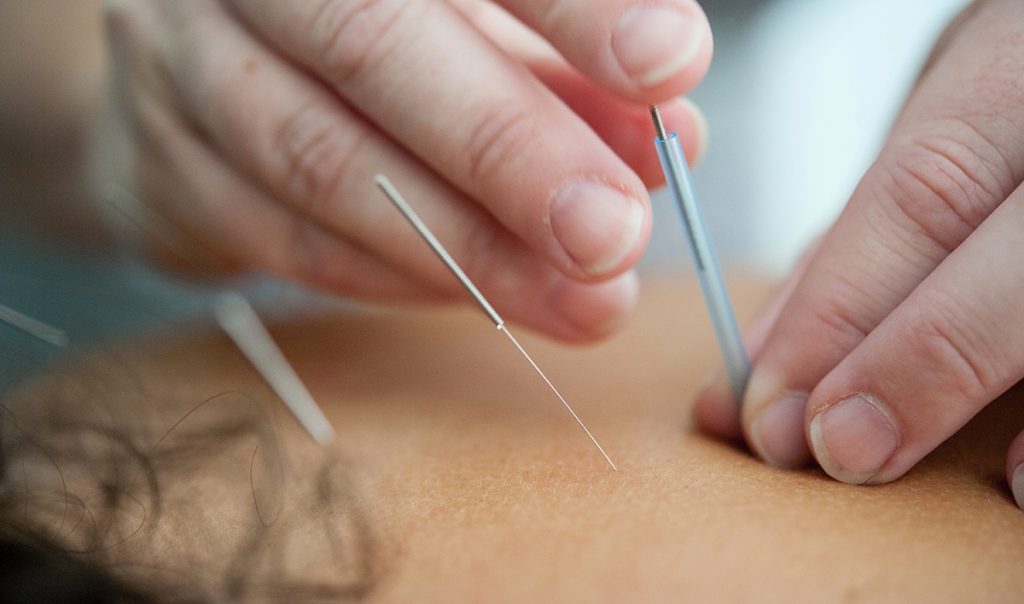
June 7, 2023 – Irvine, Calif. The National Institute of Health’s National Center for Complementary and Integrative Health has awarded a five-year U24 grant totaling $5.8 million to researchers at Harvard University and UCI, with leadership from UCI Samueli Endowed Chair Richard “Rick” Harris, PhD, of the UCI Susan Samueli Integrative Health Institute and professor in the Department of Anesthesiology & Perioperative Care in the UCI School of Medicine. Dr. Harris will serve as a co-principal investigator to support the creation and curation of a new open-access repository and database for acupuncture research called TARA (Topological Atlas and Repository for Acupoint research). The project will create an important bridge between traditional East Asian medical theories and modern understanding of anatomy and physiology.
Acupuncture originated from traditional Chinese medicine and is increasingly integrated in conventional care for the treatment of a range of conditions, particularly chronic pain disorders. A critical component of acupuncture therapy is acupuncture points, or acupoints, specific locations across the body surface where inserting and manipulating a needle can create clinically beneficial effects.
Dr. Harris and co-principal investigators propose an open-access web-based portal and database, which will incorporate 1) an acupoint ontology using both traditional East Asian Medicine and modern biomedicine nomenclature systems, 2) a male and female standardized human body atlas with 3D coordinate system based on a common origin reference point, 3) an easily searchable database, curated by an expert-committee, that includes previously published physiological data associated with acupoint stimulation.

The award will be led by Dr. Harris at UCI and Drs. Vitaly Napdow and Karl Helmer at Harvard Medical School. These researchers will create four cores with distinct expertise, working together to build the TARA platform. The TARA.DB-Core will create the database web portal with storage for the open-access repository of anatomical and physiological data. This core will be co-led by Helmer, PhD, assistant professor in Radiology, Harvard Medical School, and Napadow, PhD, LAc, professor, Harvard Medical School; director, Center for Integrative Pain NeuroImaging; and director, Scott Schoen and Nancy Adams Discovery Center for Recovery from Chronic Pain at Spaulding Rehabilitation Hospital.
Harris will lead the TARA.TEAM-Core, which will bring together acupuncture domain expertise, lead the nomenclature definition effort, and work with the TARA.DB-Core to form a data access committee. This core will also lead outreach efforts to solicit anatomical and physiological data from the international acupuncture research community. It will be supported by the Society for Acupuncture Research (the leading international academic acupuncture research organization), ensuring broad outreach to acupuncture research communities worldwide.
“I am excited for the opportunity to contribute to this innovative research on Traditional East Asian Medicine (TEAM),” said Harris. “TARA has the potential of making a significant contribution to TEAM research that can extend into the larger field of biomedical studies. If utilized to its fullest, TARA will benefit people’s health and wellbeing, and the way in which chronic diseases are studied and treated.”
The TARA.Atlas-Core will create a standard-space topographical body atlas and acupoint visualization tool for the web portal, allowing for coordinate system definition and facile interoperability with the database and acupoint repository. This core will be led by Peter Hunter, PhD, at the University of Auckland, who previously led the Map Core for highly successful NIH SPARC (Stimulating Peripheral Activity to Relieve Conditions) network. This core will create scaffold mapping tools to enable users to robustly and reproducibly map anatomical and physiological data onto the whole-body scaffold, including required metadata and visualization files for rendering and visual exploration on the TARA web portal. Human anatomical data for the platform will be supplied by novel high-resolution MRI data collection with MR-opaque acupoint fiducial markers, an effort led by co-PI Napadow at the Martinos Center for Biomedical Imaging at Harvard.
The Atlas-Core will also utilize existing human and animal (for a parallel acupoint repository and database) MRI and/or cadaver cryosection datasets, facilitated by Esra Neufeld, PhD, from the IT’IS Foundation at University of Zurich. The foundation manages virtual human and animal body phantoms for tissue segmentation and computer simulation with electromagnetic field mapping for acupoint locations defined on the topological body atlas.
Finally, The TARA.K-Core will coordinate knowledge management for the TARA platform, and will be led by Maryann Martone, PhD, from UCSD who currently leads the K-Core for SPARC and has over 15 years of experience in building and using ontologies for neuroscience in information systems. This core will build acupoint ontologies that define nomenclature and connect acupoints with one another and with known anatomical structures (muscles, tendons, peripheral nerves, etc.). Both TEAM and biomedical constructs will be included in the ontology database, which will be coordinated with the SPARC ontology database for seamless integration during the latter phase of the project.
This is an innovative project, which has the possibility to stimulate cross-discipline mechanistic and clinical research that spans the continuum of integrative care and crosses over into modern biomedical research. Harris predicts that TARA will form an invaluable research resource center for the acupuncture research community by strengthening the biological basis of acupoints, facilitating acupuncture integration into clinical care.
“Dr. Harris’s work is critical to the discovery mission in integrative health and is exemplary of the dedication of the Samueli Institute to support and sustain rigorous research that underlies the evidence-informed, integrative approach to personalized health and wellness,” said Shaista Malik, MD, PhD, MPH, founding executive director of UCI Susan Samueli Integrative Health Institute.
About the UCI Susan Samueli Integrative Health Institute
The UCI Susan Samueli Integrative Health Institute is reimagining healthcare, complementing conventional treatments with integrative services that are informed by science and incorporated into the training of future health professionals to advance a model of team-based, whole-person care that helps patients achieve their best health. It is the Samueli Institute’s mission to transform healthcare through the practice of integrative health by conducting rigorous research; promoting evidence-informed treatment modalities; educating the public on wellbeing practices, providing individualized, patient-centered clinical care; and providing services to the community that focus on obtaining optimal health.
Contact:
Tonya Becerra
Communications and Marketing Manager
UCI Susan Samueli Integrative Health Institute
tbecerra@hs.uci.edu or 949-824-9385